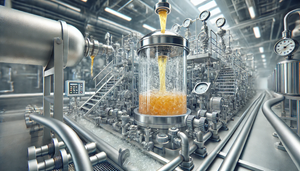Effects of Filtration on Grades
Jul 23, 2024
Maple syrup, that beloved amber elixir, has graced our breakfast tables for generations. It’s a sweet addition to pancakes and waffles and a symbol of natural goodness and artisanal craftsmanship. As maple syrup lovers, foodies, and restaurant enthusiasts, we often take for granted the clarity and grade of our syrup without considering the meticulous processes that go into its production. One crucial aspect of this process is filtration. In this blog post, we will explore how different filtration methods impact the clarity and grade of maple syrup, bringing to light the importance of this often-overlooked step in syrup production.
The Importance of Filtration in Maple Syrup Production
Filtration plays a pivotal role in determining the quality of maple syrup. During the boiling process, sap transforms into syrup, leaving behind impurities such as niter (sugar sand), which can affect the syrup's clarity and texture. Proper filtration removes these impurities, ensuring a smooth and visually appealing product.
Key Benefits of Filtration:
- Improves Clarity: Removes suspended particles, producing clear, translucent syrup.
- Enhances Flavor: Eliminates impurities that can impart off-flavors.
- Determines Grade: The final grade of syrup is influenced by clarity and color.
Different Filtration Methods
- Gravity Filtration
- Process: Syrup is poured through a filter (often made of wool or synthetic material), which uses gravity to separate impurities.
- Benefits: Simple and cost-effective.
- Drawbacks: It can be slow and may only remove some fine particles.
- Pressure Filtration
- Process: A pump is used to force syrup through a filter, usually made of synthetic or paper materials.
- Benefits: Faster and more efficient than gravity filtration, removes finer particles.
- Drawbacks: Requires more equipment and maintenance.
- Centrifugal Filtration
- Process: Uses centrifugal force to separate impurities from the syrup.
- Benefits: Highly effective in removing both coarse and fine particles.
- Drawbacks: Expensive and requires specialized equipment.
- Reverse Osmosis
- Process: Syrup is passed through a semipermeable membrane, which filters out impurities.
- Benefits: It is very efficient, improves clarity, and can also concentrate sap before boiling, saving time and energy.
- Drawbacks: High initial cost and maintenance.
How Filtration Affects Syrup Grades
Maple syrup grades are determined by color, clarity, density, and flavor. The grading system includes:
- Grade A Golden: Lightest color, delicate flavor.
- Grade A Amber: Rich color, more pronounced flavor.
- Grade A Dark: Dark color, robust flavor.
- Grade A Very Dark: Deep color, strong flavor.
Filtration directly impacts the clarity, influencing the color and perceived flavor intensity. For instance, clearer syrup (free from niter) tends to have a more delicate flavor and a lighter color, prized in the Grade A Golden category.
|
Filtration Method |
Impact on Clarity |
Impact on Flavor |
Suitability for Grade |
|
Gravity |
Moderate |
Slight enhancement |
All grades |
|
Pressure |
High |
Significant enhancement |
All grades |
|
Centrifugal |
Very High |
High enhancement |
Higher grades (Golden, Amber) |
|
Reverse Osmosis |
Very High |
High enhancement |
Higher grades (Golden, Amber) |
Conclusion
Understanding the effects of filtration on maple syrup grades allows us to appreciate the craftsmanship that goes into every bottle. Each method has unique benefits and impacts on the final product, from simple gravity filtration to advanced reverse osmosis. As you savor the rich, wholesome sweetness of your next maple syrup pour, remember the meticulous process that ensures its quality and purity.
Frequently Asked Questions (FAQs)
Q: Why is filtration important in maple syrup production?
A: Filtration removes impurities, improving the clarity, flavor, and grade of the syrup.
Q: What is niter, and why must it be removed?
A: Niter, or sugar sand, is a natural impurity that forms during boiling. It can affect the syrup's texture and clarity.
Q: Which filtration method is the best for high-quality syrup?
A: Reverse osmosis and centrifugal filtration are highly effective for producing clear, high-grade syrup.
Q: Can filtration affect the flavor of maple syrup?
A: Yes, removing impurities can enhance the syrup's natural flavors, making it taste cleaner and more pure.
Q: Is filtered syrup healthier than unfiltered syrup?
A: Filtration doesn't significantly affect the nutritional value but improves the syrup's aesthetic and taste qualities.


